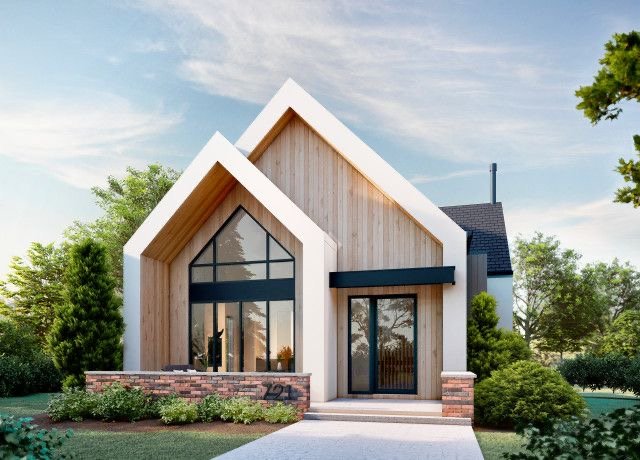by Ar. Sakshi Agiwal | Modular Pre-fabricated Homes, Wooden Homes | 16 December, 2025
In recent years, Prefab Homes have transitioned from being a niche to a mainstream option. Thanks to their precision, minimal wastage, speedy construction, and affordability.
However, behind each successful prefab home project, there is an extensive, complex supply chain that works quietly in the background. It comprises hundreds of players, right from raw material suppliers to installation experts, working tirelessly to deliver quality and ensure timely completion. These players, including prefab house manufacturers, maintain consistency in every phase of the project, ensuring seamless project progress. Now, speaking of manufacturers, how do they ensure uniformity across every project they undertake? Let us find out.
Standardized Design Frameworks
Prefab manufacturers use standardized design systems, usually based on BIM (Building Information Modeling). It helps them ensure design consistency from the conceptualization stage. On the other hand, they create digital models that enable teams to replicate components across projects with minimal variation. Such a uniform approach helps reduce the risk of errors and ensure straightforward module integration on the actual site.
Long-Term Supplier Partnerships
Responsible Prefabricated House Manufacturers work with dependable suppliers and vendors who resonate with their objectives and approach to customer excellence. These long-term, reliable partnerships translate into reduced lead-time variability, restrict supply disruptions, and ensure consistency in the material grade, insulation, and finishes. Thus, although the designs and customizations vary, consistency remains uniform across every project.
Efficient Inventory Management
Prefab involves the use of several materials, each of which is stocked to ensure a timely supply. This often complicates inventory management. Leading Prefabricated House Manufacturers thus manage inventories through advanced ERP systems that provide real-time stock visibility, notify about overstocking and understocking, and ensure optimal inventory every time. Therefore, manufacturers do not have to look for stock during production. They can plan resources and production efficiently, ensuring timely completion.
Centralized Manufacturing in a Controlled Environment
Unlike traditional construction, where most of the work is done onsite, prefab construction involves a centralized manufacturing unit and process. The latter includes building modules in a controlled environment housed in a single manufacturing facility. Therefore, factors like weather disruptions, adverse site conditions, or labor inconsistencies have little to no impact on the construction process and quality.
Automated Production and Precision Engineering
Automation is one of the key factors helping prefab manufacturers deliver identical outcomes and products at scale. It involves using advanced CNC machines, robotic cutters, and automated assembly lines that deliver millimeter-level precision – something nearly impossible to achieve onsite with archaic tools or manual techniques.
Well while building any prefab house or farmhouse installation, time, labor, and logistics play an important role to build at the right time. So, to get it timely delivered one must follow these things. Read our blog on “Prefab Farmhouse Installation: Timeline, Labor & Logistics” and get to know more about it.
Extensive and Stringent Quality Checks
Usually, on-site construction has little scope to perform quality checks. But prefab supply chains tick this box too. Since they are built in a controlled environment in an off-site facility, manufacturers have ample time to inspect material at arrival, perform in-line checks during manufacturing, and conduct post-assembly inspection before transporting the modules. It refers to a layered approach that allows manufacturers to identify problems early and correct them proactively. This helps save on-site time and costly reworks.
Logistics Designed for Repeatability
Prefab manufacturing is not merely about building modules but also transporting them safely and in a timely manner to the site. Accordingly, manufacturers use standardized packaging, labeling, and loading sequences to ensure prefab modules arrive on-site in time and correctly. Such consistencies help keep the project on schedule and ensure safe transportation.
Feedback Mechanisms
Every project is a learning. The best ones in the business understand this. Therefore, they collect data from every project across parameters like installation, customer feedback, post-occupancy information, etc., to further refine their supply chains. Such cyclical improvement maintains consistency despite high project volumes and new product roll-outs.
Final Words!
Building a Prefabricated House in India involves numerous challenges, including managing supply chain complexities. But this is where the approach of manufacturers steps in. The best Prefabricated House Manufacturers set processes and adhere to them to handle intricacy meticulously. They ensure timely completion and quality homes, while managing supply chain aspects and challenges. So, if you want to build a prefab home, you need a manufacturer with proven expertise and experience in supply chain management.
Partner with Vrisa!
One of the leading manufacturers of prefabricated homes, Vrisa is a dependable partner with years of experience and an established supply chain ecosystem. We partner with reliable suppliers, use technology, and work with a customer-centric approach. These are pillars of our success and our customers’ happiness, helping us transform the vision of Prefab Homes into reality. Hence, prefab construction with us helps you save more than just money!
Want to know more about our prefab expertise and portfolio? Call us at +91 9322862232 and connect with our experts.
